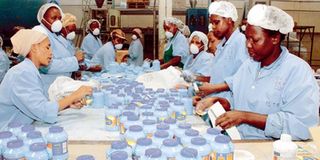Strong industry will spur economic growth

Workers at the Orbit Chemical Industries in Nairobi. When an even more enabling environment for business is in place, manufacturing will dramatically prosper and provide the economic growth and jobs envisioned in the Big Four and also Vision 2030. PHOTO | FILE | NATION MEDIA GROUP
What you need to know:
- Manufacturing is no longer an enclave concentrated in Nairobi.
- Counties are the new frontiers of growth and manufacturing and will play a key role in supporting development at the grassroots.
- As we venture into the counties, collaboration between the government and the private sector will boost economic growth.
For two years consecutively, Kenya has been ranked as the third-most improved country in the World Bank’s Ease of Doing Business survey. It also remains an attractive investment hub in the East African region, drawing benefits from its geo-strategic position.
An examination of manufacturing-led economies such as China, Japan and Singapore reveals that these countries did not achieve success by chance. They rolled out deliberate economic policies that set the stage for their enviable industrial take-off.
INVESTMENTS
In 2015, Kenya embarked on a revival of its industrial and manufacturing sectors through the Kenya Industrial Transformation Programme. The decade-long plan projected that manufacturing sector jobs would increase by 435,000, driven by a sustained focus on investments.
This year, the government launched the ‘Big Four’ development agenda supported by four pillars, among them manufacturing. The aim is to increase the sector’s contribution to gross domestic product (GDP) from 9.2 per cent to 20 per cent by 2022.
DISTRIBUTION
Manufacturing is no longer an enclave concentrated in Nairobi. Counties are the new frontiers of growth and manufacturing and will play a key role in supporting development at the grassroots. As we venture into the counties, collaboration between the government and the private sector will boost economic growth.
Two years ago, the Kenya Revenue Authority launched a smartphone application, Soma Label, that scans the stamps on consumer products and checks if they are genuine or not, guaranteeing their safety. That heralds a future when manufacturers will tap into technology to ensure counterfeit products do not flow through their distribution chains.
AFFORDABLE
But as manufacturers strive for affordable high-quality products and manufacturing plays its irreplaceable role in driving growth and economic development, a conducive environment for investors is necessary. Regulatory and tax policy changes usually have a significant impact on the success of the manufacturing sector. It is, therefore, essential for the government to invest in conducting regular impact studies in this area before making changes that could have a drastic effect on the operating environment and investments by the private sector.
In a 2015 report by KPMG titled “Fast-Moving Consumer Goods in Africa”, Kenya was among the countries marked to have the potential for growth in the next five to 10 years — an indication that this segment has been a significant driver of economic growth.
VISION 2030
When an even more enabling environment for business is in place, manufacturing will dramatically prosper and provide the economic growth and jobs envisioned in the Big Four and also Vision 2030.
With resources shrinking, population growing and trade borders fading, manufacturers are looking for more efficient ways to produce, but governments, national or devolved, have to play their part for the sector to step on the next pedestal.
Ms Karuku is the managing director, Kenya Breweries Limited (KBL). [email protected].





